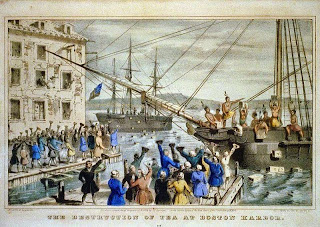 The weekly collection of useless and fun facts. In this week’s edition: The Teddy Bear, Zambia Astronauts, The Cuban Game of Monopoly, Boston Tea Partiers, and Two Least Likely Actors
The weekly collection of useless and fun facts. In this week’s edition: The Teddy Bear, Zambia Astronauts, The Cuban Game of Monopoly, Boston Tea Partiers, and Two Least Likely Actors
 The teddy bear is the namesake of President Theodore Roosevelt and originated in 1902 when the president refused to kill a bear that his hunting party had captured. But there’s more to the story than just this. The hunting trip took place in Mississippi and happened because of an invitation by the governor of the state, Andrew H. Longino. Roosevelt hadn’t seen a bear in three days of hunting, but other members of the party had. Not wanting to look like the hunt had been a loss, the guides tracked an old bear that had been attacked by the dogs used in the hunt and eventually tied the bear to a tree so the president could bag a bear. Roosevelt refused to shoot the aged bear, and ordered that the wounded bear be put down instead.
The teddy bear is the namesake of President Theodore Roosevelt and originated in 1902 when the president refused to kill a bear that his hunting party had captured. But there’s more to the story than just this. The hunting trip took place in Mississippi and happened because of an invitation by the governor of the state, Andrew H. Longino. Roosevelt hadn’t seen a bear in three days of hunting, but other members of the party had. Not wanting to look like the hunt had been a loss, the guides tracked an old bear that had been attacked by the dogs used in the hunt and eventually tied the bear to a tree so the president could bag a bear. Roosevelt refused to shoot the aged bear, and ordered that the wounded bear be put down instead.
The story spread to newspapers around the country, and a cartoonist named Clifford Berryman saw it and drew a cartoon depicting Roosevelt refusing to shoot the bear. It originally ran in the Washington Post and the association with Teddy Roosevelt and the bear was made. Morris Michtom, a Brooklyn, New York candy shop owner saw the cartoon and put two toy bears his wife had made on display. He even got the president’s permission to call these bears, “Teddy Bears.”
Around the same time Michtom was beginning to mass produce the bears, Steiff, a German company, began making stuffed bears that had no connection to the events in the U.S. An American in 1903 saw these bears and ordered a shipment of 3,000 of them. They also became known as “Teddy Bears”, and the international connection was made. All these type of bears have been known as “Teddy Bears” ever since. Source, Source
 Sometimes things are just too hard to believe, but Zambia had a space program in the 1960’s–kind of. It consisted of a grade school science teacher, a teenage girl and her cat, and missionaries. The grade-school teacher, Edward Nkoloso, claimed that Zambian astronauts would be the first to the moon and then Mars before the U.S. or the Soviet Union. Nkoloso also made himself the director of the National Academy of Science, Space Research and Philosophy, an unofficial organization. His plan was to send a copper and aluminum rocket carrying a 17-year old girl, her cat, and ten other Zambians, into space by using a catapult system. Nkoloso also made an announcement that Mars was inhabited by primitive natives, and that his missionaries wouldn’t force the natives to convert to Christianity. You can already see where this is going. Nkoloso set up the “space program” and even had training; rolling downhill in an oil drum to simulate rushing through space, a swing where the rope would be cut at the highest point to simulate zero gravity, and an exercise where the “astronauts” were taught to walk on their hands because that was the way humans would do it on the moon.
Sometimes things are just too hard to believe, but Zambia had a space program in the 1960’s–kind of. It consisted of a grade school science teacher, a teenage girl and her cat, and missionaries. The grade-school teacher, Edward Nkoloso, claimed that Zambian astronauts would be the first to the moon and then Mars before the U.S. or the Soviet Union. Nkoloso also made himself the director of the National Academy of Science, Space Research and Philosophy, an unofficial organization. His plan was to send a copper and aluminum rocket carrying a 17-year old girl, her cat, and ten other Zambians, into space by using a catapult system. Nkoloso also made an announcement that Mars was inhabited by primitive natives, and that his missionaries wouldn’t force the natives to convert to Christianity. You can already see where this is going. Nkoloso set up the “space program” and even had training; rolling downhill in an oil drum to simulate rushing through space, a swing where the rope would be cut at the highest point to simulate zero gravity, and an exercise where the “astronauts” were taught to walk on their hands because that was the way humans would do it on the moon.
The Zambian government distanced themselves from him of course, and the project never got off the ground or out of Zambia. The lone girl astronaut even got pregnant and her parents returned her to their village. There was definitely not going to be a mission to the moon or Mars. Sometimes the best laid plans just don’t come to fruition–thank goodness. Source
 Premier Fidel Castro of Cuba banned all Monopoly games and ordered all sets seized and destroyed, saying it was a symbol of an imperialistic and capitalistic system. The game was popular in the country before Castro took power in 1959, and it became clear that Castro didn’t want capitalism associated with fun. It isn’t the first time Monopoly has been thought of as a political foe. Six sets were mysteriously stolen by an unknown visitor in 1959 at an American trade exhibit in Moscow. Maybe whoever stole it really wanted to play. Monopoly has even been an ally in the war on fascism. British soldiers being held in prisoner of war camps got real money, maps, and compasses after they were secretly inserted in the game. They were part of humanitarian aid packages supplied to the prisoners. Pretty impressive for a game that has a thimble, hat and a shoe as game pieces. Source
Premier Fidel Castro of Cuba banned all Monopoly games and ordered all sets seized and destroyed, saying it was a symbol of an imperialistic and capitalistic system. The game was popular in the country before Castro took power in 1959, and it became clear that Castro didn’t want capitalism associated with fun. It isn’t the first time Monopoly has been thought of as a political foe. Six sets were mysteriously stolen by an unknown visitor in 1959 at an American trade exhibit in Moscow. Maybe whoever stole it really wanted to play. Monopoly has even been an ally in the war on fascism. British soldiers being held in prisoner of war camps got real money, maps, and compasses after they were secretly inserted in the game. They were part of humanitarian aid packages supplied to the prisoners. Pretty impressive for a game that has a thimble, hat and a shoe as game pieces. Source
 There weren’t one but two Boston tea parties. The first occurred on December 16, 1773 when Samuel Adams (yes, the guy the beer was named after) and the Sons of Liberty went aboard three ships and tossed 342 chests of tea into the water. They were ticked about the British government’s implementation of the Tea Act of 1773. The British did it to prop up the flailing East India Company, the primary tea importer. The Tea Act gave the East India Company almost complete control over the tea trade which undercut Boston merchants and other middlemen.
There weren’t one but two Boston tea parties. The first occurred on December 16, 1773 when Samuel Adams (yes, the guy the beer was named after) and the Sons of Liberty went aboard three ships and tossed 342 chests of tea into the water. They were ticked about the British government’s implementation of the Tea Act of 1773. The British did it to prop up the flailing East India Company, the primary tea importer. The Tea Act gave the East India Company almost complete control over the tea trade which undercut Boston merchants and other middlemen.
But the dumping of tea into Boston Harbor didn’t stop there. There was another tea party on March 7, 1774, when 60 men in disguises went aboard the Fortune and dumped more tea into the harbor. It wasn’t on the same scale as the first tea party; only 30 chests were thrown into the water this time. It’s estimated that the two Boston parties cost the British around $1 million in today’s money. These, in fact, weren’t the only “tea parties”. Other cities in the colonies began dumping tea into the water throughout 1774. Those colonial partiers just couldn’t get enough. Source, Source
 It’s well known that Dustin Hoffman and Gene Hackman are both accomplished actors, but some didn’t think they would amount to anything. Hackman joined the Pasadena Playhouse in 1956 and became friends with another aspiring actor named Dustin Hoffman. They were later voted “least likey to succeed” at their acting classes at the Pasadena Playhouse. Hackman and Hoffman moved to New York after their schooling and met up with another struggling actor named Robert Duvall. Hackman even ran into an instructor from the Pasadena Playhouse that he didn’t care for while working as a doorman in New York City. The instructor told him, “See, Hackman, I told you you wouldn’t amount to anything.” The rest, as they say, is history, and it gives new credence to the saying, “Living well is the best revenge.” Source
It’s well known that Dustin Hoffman and Gene Hackman are both accomplished actors, but some didn’t think they would amount to anything. Hackman joined the Pasadena Playhouse in 1956 and became friends with another aspiring actor named Dustin Hoffman. They were later voted “least likey to succeed” at their acting classes at the Pasadena Playhouse. Hackman and Hoffman moved to New York after their schooling and met up with another struggling actor named Robert Duvall. Hackman even ran into an instructor from the Pasadena Playhouse that he didn’t care for while working as a doorman in New York City. The instructor told him, “See, Hackman, I told you you wouldn’t amount to anything.” The rest, as they say, is history, and it gives new credence to the saying, “Living well is the best revenge.” Source
Past Issues of the Completely Random Facts of the Week
The condensed version of this week’s issue is below.

